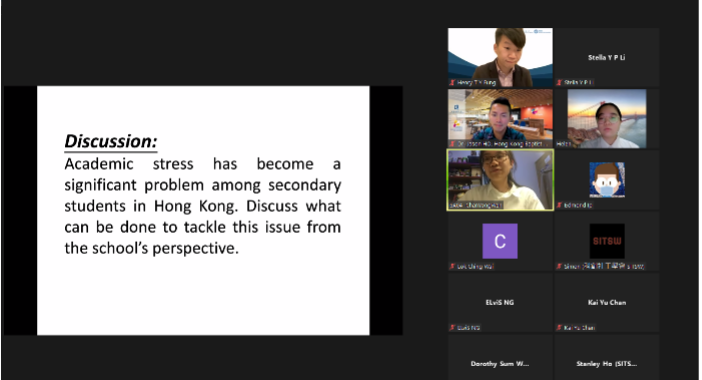Virtual Service-Learning: Online Peer Mentoring
Teacher: Dr. Henry T. Y. FUNG, Lecturer cum Associate Programme Director of PR Concentration
Department: Department of Communication Studies, HKBU
Email: henryfty@hkbu.edu.hk
Service-Learning is an educational approach that integrates community service into learning objectives. It is especially important under the COVID-19 pandemic where new and urgent needs are brought up, such that service-learning could help contribute to overcoming this difficult time. Dr. Henry Fung, Lecturer cum Associate Programme Director of PR Concentration in the Department of Communication Studies at Hong Kong Baptist University (HKBU) implemented the virtual service-learning project into the course PRAD2037 Interpersonal Communication, with an enrollment of 30 HKBU students. This project partnered with Tung Wah Group of Hospitals (TWGHs), where all students served as peer mentors and delivered two virtual communication training workshops via Zoom to 30 secondary school students coming from poor socio-economic backgrounds. Dr FUNG believes that other than merely learning passively, it is more important that students could engage in active learning and apply the theories learned in life through this Service-Learning experience.
There were three objectives of this course:
• To increase students’ ability to understand communication patterns and processes, in order to make the most suitable choices during their interactions with others
• To enhance the student awareness, self-esteem, as well as the communication competence
• To help students build a better interpersonal relationship with their family members, lovers, colleagues and friends.
The project consisted of four stages:
1. Icebreaking and pairing between HKBU students and the secondary school students; the groups needed to schedule their meetings via WhatsApp.
2. Delivering two virtual communication training workshops; students were required to conduct workshops via Zoom.
3. Conducting seven sessions of virtual university mock interviews; the format and questions of the mock interview were similar to real university entrance interviews.
4. The fourth stage was celebration and continued engagement; students distributed care gift packs to their mentees.
Service users (i.e., secondary school students) gave highly positive feedback on the project with a high response rate (over 70%) on the post-intervention online questionnaire. Most comments were positive about the project e.g. they learned different interview skills, and mentors were nice and helpful. Some reported that their self-esteem had been raised as their peer mentors always praised about their good performance in the mock interview. They felt like they were one step closer to the university.
Dr FUNG reported three difficulties he encountered during the course. Firstly, mentees were not willing to turn on their cameras due to the unfavoured disadvantaged background and shyness; Dr FUNG tackled the problems by providing mentees with virtual backgrounds and icebreaking activities respectively, his actions had comforted the mentees and more of them turned on their cameras afterwards. Secondly, it was difficult to control the quality of the services. Dr FUNG organized a rehearsal in class and provided teaching materials and samples to students; students were required to provide “evidence of excellence” for assessment. Thirdly, it was difficult to spot the “black sheep” (i.e., those with low attendance rate). Dr FUNG organised at least one mid-point progress report meeting with students to optimise communication with them and to closely monitor the attendance.
When asked about the plan for future application, Dr FUNG responded that he would continue the virtual mentoring programme and he might adopt hybrid mode instead in the future, which includes a face-to-face debriefing session. Dr FUNG would also like to run a programme to promote intergenerational communication.
Acknowledgement: this case example was co-developed by Dr Henry Fung and the HKBU’s Centre for Innovative Service-Learning (CISL) (source: https://cisl.hkbu.edu.hk/service-learning/vtl-sl)












